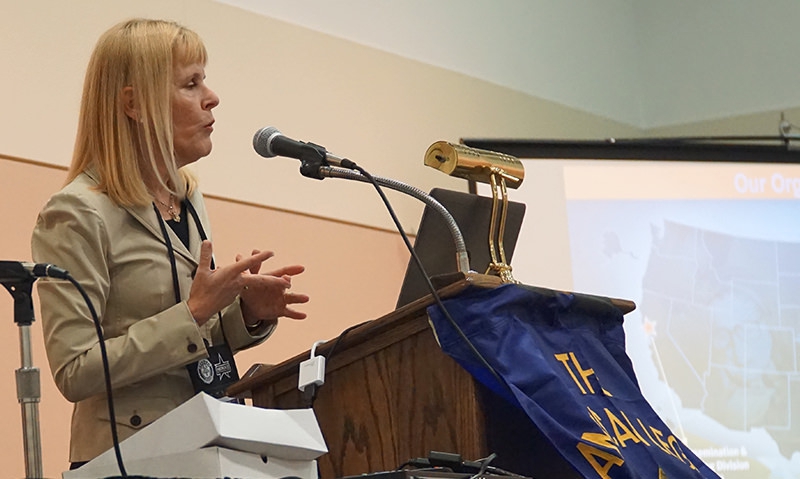
Establishing biomarkers to see post-traumatic stress disorder before it happens is one of the focuses of the National Center for PTSD.
The National Center for PTSD has six operational priorities. One of the most critical of those is trying to predict potential sufferers of post-traumatic stress disorder before they actually do.
The center’s executive director, Paula Schnurr, told members of The American Legion’s Veterans Affairs and Rehabilitation Commission that the Department of Veterans Affairs center is trying to establish biomarkers for PTSD “to predict who develops PTSD, to diagnose PTSD, to predict treatment outcome and measure treatment response,” Schnurr said. “(PTSD-caused suicide) is a crisis in this country. It’s the highest clinical priority of (VA Secretary David Shulkin).”
Schnurr said the center is trying to develop effective PTSD treatments. “We’re trying to develop strategies to enhance the effectiveness of existing treatments and to enhance treatment engagement,” she said. “Treatments only work if you engage.
“We actually have a lot of effective psychotherapies. We have two FDA-approved medications, and they only work so well. So novel medications are something that we care about.”
The center has created several apps and other materials to assist those suffering from PTSD and their family members. The center’s PTSD Coach app has been downloaded 275,000 times in 98 different countries.
“If you try to think about what we are, we’re an information business,” Schnurr said. "We generate information. We collate, synthesize, disseminate and promote the implementation of the best information on PTSD. It’s critically important that all veterans, their family members (and) the nation as a whole have the best information to inform whatever decisions they make.”
Addressing the commission, Past National Commander Bill Detweiler – chairman of the Legion’s Traumatic Brain Injury/Post-Traumatic Stress Disorder Ad Hoc Committee – said the Legion will continue to push for alternative treatments for PTSD.
“We are looking to see what we can do as an organization to urge the VA, to urge the military and … to get congressional funding to find the funds necessary to do the studies (on alternative treatments), even though the studies may be hard,” Detweiler said. “Let’s take a look at things that are available that maybe are not used but could be used – not to hurt somebody, but to maybe give them a better quality of life. On our end, that’s what we’re all about.”
The commission also received an update on the Million Veteran Program (MVP), a VA effort to collect genetic information from 1 million veterans in order to build a database of genetic, military exposure, lifestyle and health information.
The purpose of the MVP is to learn more about how a person's genetics affects their health so that doctors can better understand diseases and design future treatments specific to an individual's molecular body composition.
MVP Program Director Sumitra Muralidhar said 590,000 genetic samples have been collected. Included in the database are 50,000 women veterans and 108,000 African-American veterans. “Our goal is to partner with veterans to create one of the largest and most comprehensive databases … and open that up for research,” Muralidhar said. “We are now currently the largest. There are many such databases around the world, but no one in the world has as comprehensive as an electronic health record as VA does.”
Jennifer Deen, who works on recruitment, engagement and public relations for MVP, said opportunities exist for Legionnaires to stage events to raise awareness about the program. “In your areas we can connect you to our local site teams,” she said. “If there’s a facility around you, they can come out and give talks at your posts. We can arrange events. There’s a lot we can do with you guys.”
- Convention

